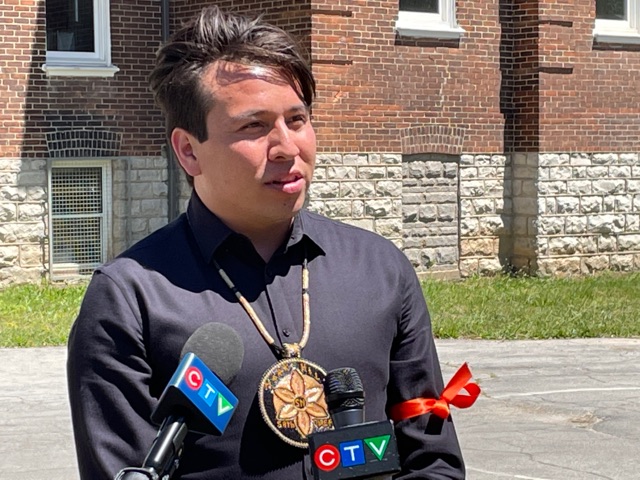
It has come to my attention that officials with the Ministry of Indigenous Affairs recently met with a representative of the Survivors’ Secretariat – a new organization created by Survivors for Survivors, to uncover and share the truth about what happened to children at the Mohawk Institute. The purpose of this meeting was to discuss what support the Province of Ontario could provide to the Secretariat to further their efforts to search for the missing children and unmarked burials on the 500 acres of lands associated with Canada’s first and longest operating Indian Residential School. I was informed that Deputy Minister Batise stated that the Ministry would only commit $400.000.00 over three years to this Sacred work. With all due respect, this amount of funding falls short and is not commensurate with Ontario’s role in the operation of the school. It is also contrary to the “meaningful reconciliation” that you committed to.Premier Ford, on June 15, 2021 you stated that you were “heartbroken by the news of a burial site containing the remains of 215 Indigenous children at the former Indian Residential School in Kamloops, British Columbia” and that your government “is partnering with Indigenous communities to address the loss of generations who are no longer with us”. Notwithstanding this statement, your Deputy Minister of Indigenous Affairs advised the Secretariat that the province would be dividing up a small pool of funds between and among the First Nations associated with the 18 known residential schools in Ontario, and that this was an “equitable” approach. Cleary, the Deputy Minister has no understanding of what the definition of equity is. Treating all communities the same is not equity.As you may know, the Mohawk Institute operated for over 136 years. As noted above, it is the first and longest operating Indian Residential School in Canada. Children from over 25 (and counting) First Nations were forced to attend the Institute and were subjected to physical, sexual, emotional and Spiritual abuse. These children were apprehended from communities in Southern Ontario, the far north, and from Quebec. Searching the grounds, gathering the historical records, and communicating with Survivors groups and gathering their statements across several regions and provinces will be complex work. The Secretariat requires meaningful support, not perfunctory and superficial commitments.
For far too long, Canadians have turned a blind eye to the atrocities that occurred in the Indian Residential schools. The courage and strength of the Survivors, and the work of the Truth and Reconciliation Commission exposed the genocide that settlers perpetrated against our Peoples. Premier, for reconciliation to occur, there has to be awareness of the past, acknowledgement of the harm that has been inflicted, atonement for the causes, and action to change behaviour.Based on discussions with your officials, we do not think that your government fully understands the past. The historical records are clear – the Province of Ontario was an active participant in this attempt to destroy our peoples. The records show that Ontario, through the work of several of its Ministries were involved with the school. Some examples include:
- The Ministry of Education created policies that permitted corporal punishment in the Mohawk Institute and failed to monitor its excessive use.
- The Ontario Provincial Police aided the Mohawk Institute with collecting the children when they ran away and returned them to the Institute to be further abused.
- The Ministry of the Attorney General, prosecuted children for stealing food when they were hungry and sent them to the provincially run reformatory schools where they experienced further trauma.
- The Ministry of the Attorney General prosecutors failed to prosecute sexual and physical abuse cases that were brought to their attention.
- The Ministry of the Attorney General prosecutors advocated for children to be sentenced to the Mohawk Institute in criminal and child welfare matters.
- The Office of the Fire Marshall and the Grand Jury process inspected the Institute and failed to recognize and report the conditions that the children were living under and quietly allowed the harm to continue.
- The Ministry of Health operated the Sanitoria and Hospital institutions that many of the children were taken to and quickly released back into the hands of the perpetrators.
There are many more examples of Ontario’s involvement with the Mohawk Institute, and its failures to put an end to the church and federal government’s genocide attempts. As such, you can understand why we are offended by the Minister of Indians Affairs approach to the Survivors’ Secretariat’s request for support.I wish to also note for the record, the Minister of Indigenous Affairs has frequently noted that he was part of the Indian Residential School Settlement Agreement. This in fact is true. However, what he fails to mention, is that he signed the agreement on behalf of a law firm that faced misconduct proceeding brought by the Survivors they represented. This in our view, does not make him the ideal person to be managing the government’s support to communities that are recovering their children. We have deep concerns that the Survivors’ search for justice is being hampered by the Ministry of Indigenous Affairs.The Survivor Secretariat has requested $3 million dollars for this fiscal year and $3 million for 2022-23, 2023-24. We know that this will not be enough to accomplish the work it needs to complete. However, it is more equitable than the mere $400,000.00 currently suggested by your officials.
Premier, I urge you to correct this misstep taken by the Ministry of Indigenous Affairs and direct your officials to provide the funding requested. I would be more than happy to meet with you on an urgent basis to discuss this matter further.
